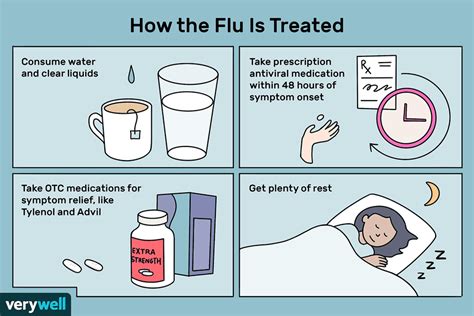How to Treat the Flu: A Guide to Recovery
The flu, or influenza, is a common viral infection that can leave you feeling miserable. While there's no magic cure, there are effective ways to treat the flu and alleviate its symptoms. This guide will walk you through the best approaches to manage your flu and speed up your recovery.
Understanding the Flu
Before diving into treatment, it's crucial to understand what the flu is. It's caused by influenza viruses, which spread through the air via coughs and sneezes. Symptoms typically include fever, cough, sore throat, body aches, headache, and fatigue. These symptoms can range from mild to severe, depending on your overall health and the specific strain of the flu.
Treating the Flu at Home
Most people can effectively manage flu symptoms at home with rest and supportive care. Here’s what you can do:
Rest is Key:
Prioritize sleep. Your body needs rest to fight off the virus. Avoid strenuous activity and allow yourself plenty of time to recover. This is arguably the single most important factor in your recovery.
Hydration is Essential:
Drink plenty of fluids. Flu often leads to dehydration. Water, clear broths, and electrolyte drinks are excellent choices. Avoid alcohol and caffeine, as they can further dehydrate you.
Over-the-Counter Medications:
Use over-the-counter (OTC) medications to manage symptoms. Pain relievers like acetaminophen (Tylenol) or ibuprofen (Advil, Motrin) can help reduce fever and aches. Decongestants and cough suppressants may also provide relief, but always follow the dosage instructions carefully. Consult a doctor or pharmacist if you have any questions or concerns about medication interactions, especially if you are taking other medications.
Soothing Measures:
- Gargle with salt water: This can soothe a sore throat.
- Use a humidifier: Adding moisture to the air can help relieve congestion.
- Rest your voice: Avoid talking excessively to prevent further throat irritation.
When to See a Doctor
While most cases of the flu resolve within a week or two, some situations require professional medical attention. Seek medical care if:
- Your symptoms are severe. This includes high fever, difficulty breathing, chest pain, or confusion.
- Your symptoms worsen. If your symptoms don't improve after a few days or get worse, it's time to see a doctor.
- You have underlying health conditions. Individuals with chronic health problems are at higher risk of complications.
- You're at high risk. This includes young children, older adults, pregnant women, and people with weakened immune systems.
Preventing the Flu
The best way to treat the flu is to prevent it in the first place. Here are some preventative measures:
- Get vaccinated: The flu vaccine is the most effective way to protect yourself from the flu.
- Practice good hygiene: Wash your hands frequently with soap and water, and avoid touching your face.
- Cover your coughs and sneezes: Use a tissue or your elbow to cover your mouth and nose when you cough or sneeze.
- Avoid close contact: Stay away from people who are sick.
This comprehensive guide provides essential information on treating and preventing the flu. Remember, while home remedies can effectively manage symptoms, seeking professional medical advice is crucial when necessary. Prioritizing rest, hydration, and preventative measures significantly improves your chances of a swift and complete recovery.
